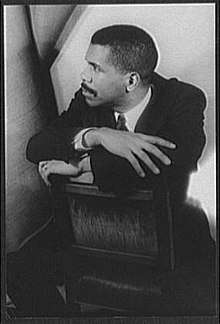William Melvin Kelley
William Melvin Kelley (November 1, 1937 – February 1, 2017) was an African-American novelist and short-story writer. He is perhaps best known for his debut novel, A Different Drummer, published in 1962.[2][3] He was also a university professor and creative writing instructor. In 2008, he received the Anisfield-Wolf Book Award for Lifetime Achievement.
William Melvin Kelley | |
|---|---|
 William Melvin Kelley (1963) | |
| Born | November 1, 1937 New York City, New York |
| Died | February 1, 2017 (aged 79) Manhattan, New York |
| Occupation | Writer, educator |
| Alma mater | Harvard University |
| Genre | Novel, short story |
| Notable works | A Different Drummer (1962), dem (1967) |
| Notable awards | Anisfield-Wolf Book Award |
| Spouse | Karen (Aiki) Kelley[1] |
| Children | Jessica (daughter), Cira (daughter)[1] |
Life and work
William Melvin Kelley was born in New York City on November 1, 1937, and grew up in The Bronx.[2] He was educated at the Fieldston School in New York[3] and at Harvard University (class of 1960),[4] where he studied under John Hawkes and Archibald MacLeish. While a student at Harvard, he was awarded the Dana Reed Prize for creative writing.[2] His debut novel, A Different Drummer, was published when he was 24 years old, in 1962. In that year he married Karen Gibson (later to be known by the first name Aiki).[2] In 1964 Kelley's short-story collection, Dancers on the Shore, was published, and in 1964 his second novel, A Drop of Patience.
In the 1960s Kelley lived in Paris, France, where he wrote his novel dəm (1967) and lectured in American literature at the University of Paris[5] He also spent some time in Rome, and after the 1968 assassinations of Martin Luther King, Jr. and Robert F. Kennedy, Kelley and his wife decided they did not want to raise their family in the US,[6] and with their two young daughters moved to Jamaica,[6] where he and his family converted to Judaism.[3]
Kelley was also a teacher and writing instructor. His academic appointments included a time as writer-in-residence at the State University of New York at Geneseo; he also taught at the New School for Social Research and at Sarah Lawrence College from 1989[7] until his death in 2017.[2]
In 1988 Kelley starred in Excavating Harlem in 2290, which he also wrote and produced, collaborating with Steve Bull to bring it to the screen.[2] He also contributed to The Beauty That I Saw, a film assembled from Kelley's video diaries of Harlem. Edited by Benjamin Oren Abrams, it was featured at the Harlem International Film Festival in 2015.[2]
Kelley published four novels and a volume of short stories. In a 2012 interview he claimed to have completed two more novels that have thus far remained unpublished.[8] According to Robert E. Fleming:
From the beginning of his career in 1962, William Melvin Kelley has employed his distinctive form of Black comedy to examine the absurdities surrounding American racial attitudes.[9]
Death
Kelley died in Manhattan on February 1, 2017, due to complications from kidney failure. He was 79.[2][1]
Bibliography
- A Different Drummer, Doubleday (1962), reprinted by Anchor Books (1990), ISBN 0-385-41390-4
- Dancers on the Shore, Doubleday (1964), reprinted by Howard University Press (1982), ISBN 0-8825-8114-7
- A Drop of Patience, Doubleday (1965), reprinted by Ecco Press (1996), ISBN 0-8800-1460-1
- dem, Doubleday (1967), reprinted by Coffee House Press (2001), ISBN 1-56689-102-7
- Dunfords Travels Everywheres, Doubleday (1970), ISBN 0-8936-6101-5
References
- Boyd, Herb (February 10, 2017). "Author William Melvin Kelley passes at 79". Amsterdam News. Retrieved February 16, 2017.
- Grimes, William (February 8, 2017). "William Melvin Kelley, Who Explored Race in Experimental Novels, Is Dead at 79". The New York Times.
- Schulz, Kathryn (January 29, 2018). "'The Lost Giant of American Literature: A major black novelist made a remarkable début. How did he disappear?'". The New Yorker. Retrieved January 28, 2018. As "Remainders" in the print issue, pp. 26–31.
- Werner Sollors, Caldwell Titcomb, Randall Kennedy, Thomas A. Underwood (eds), Blacks at Harvard: A Documentary History of African-American Experience At Harvard and Radcliffe, NYU Press, 1993, ISBN 0-8147-7973-5, ISBN 978-0-8147-7973-6
- "Kelley, William Melvin 1937-", Encyclopedia.com.
- Hughes, Sarah (October 27, 2018), "Lost literary masterpiece of 1960s black America comes to UK", The Observer.
- Contemporary African American Novelists: A Bio-Bibliographical Critical Sourcebook, Emmanuel S. Nelson, editor. Westport, CT: Greenwood Press, 1999, p. 238. See web version (accessed September 16, 2008).
- Kemme, Steve (October 30, 2012), "William Melvin Kelley", Mosaic Magazine.
- Excerpted from The Oxford Companion to African American Literature (New York: Oxford University Press, 1997), quoted in aalbc.com, Retrieved September 16, 2008.
External links
- Brief biography
- William Kelley at aalbc.com
- Bio from Contemporary African American Novelists
- Works by or about William Melvin Kelley in libraries (WorldCat catalog)
- Stuart A. Rose Manuscript, Archives, and Rare Book Library, Emory University: William Melvin Kelley family papers